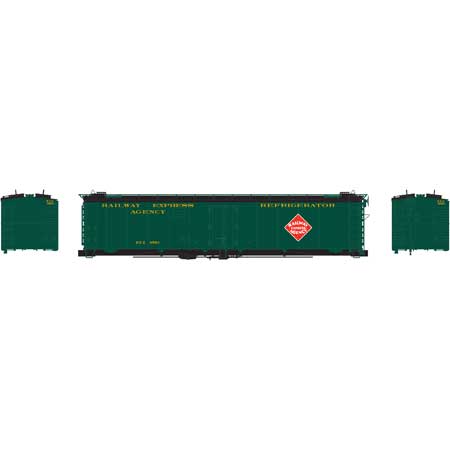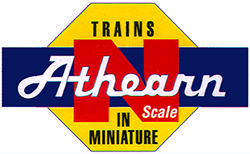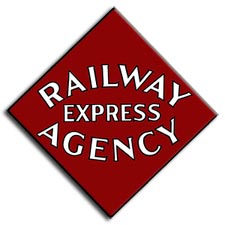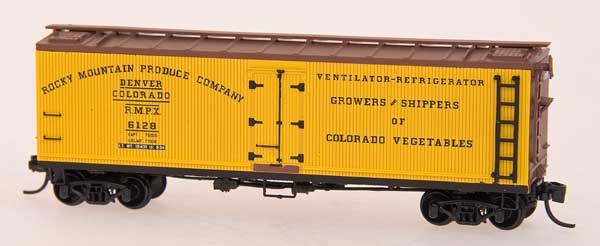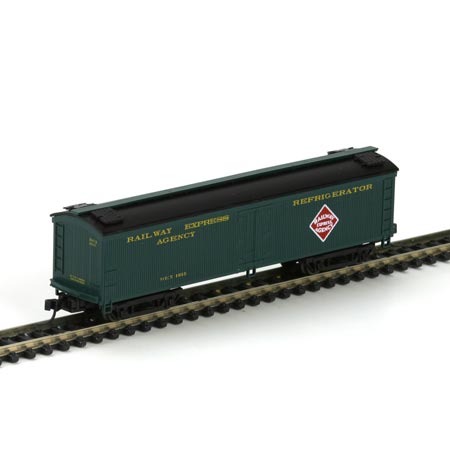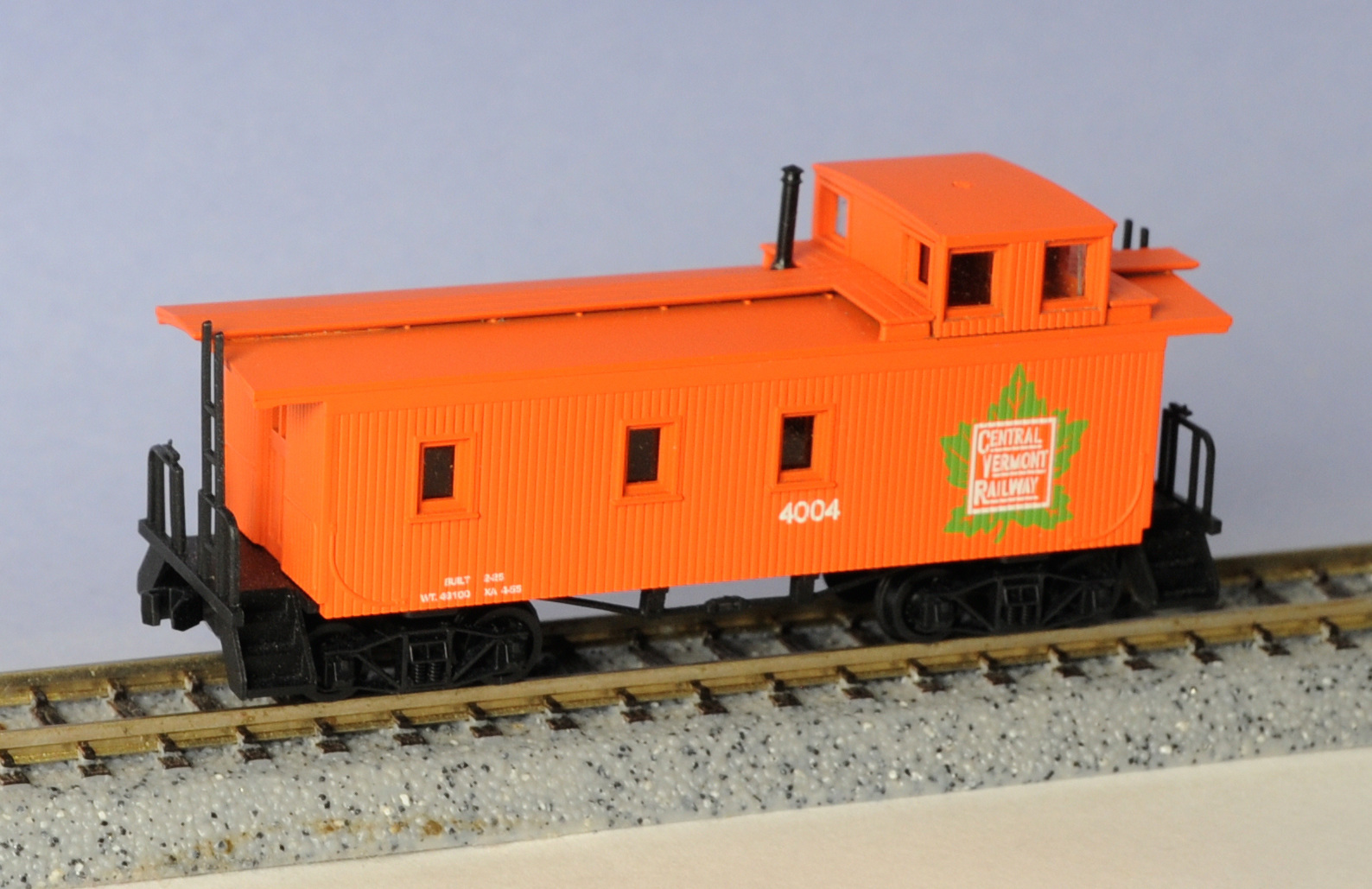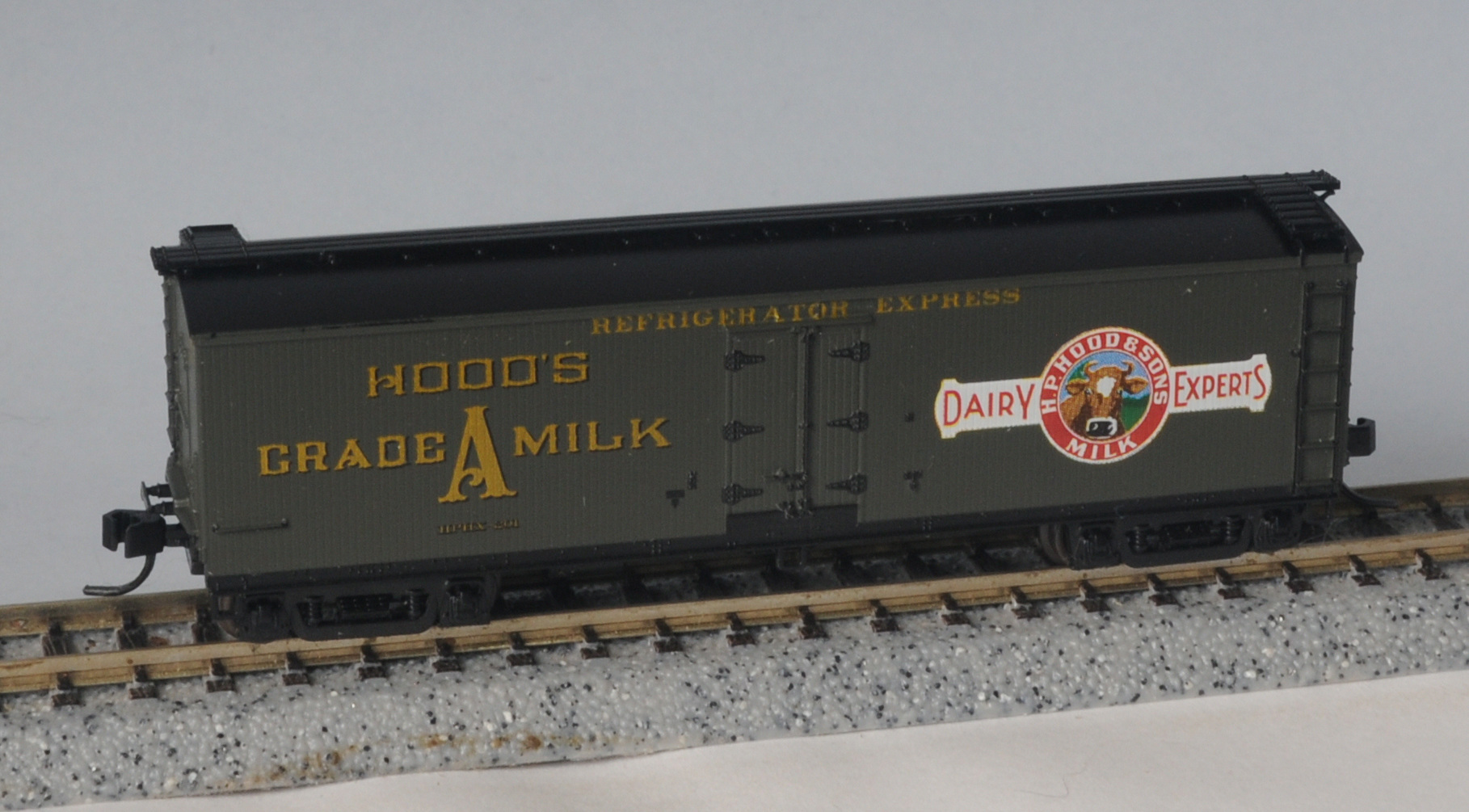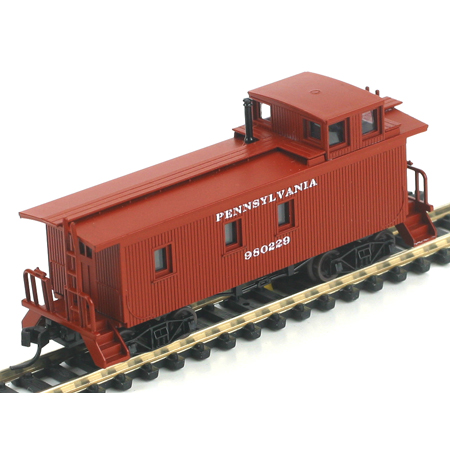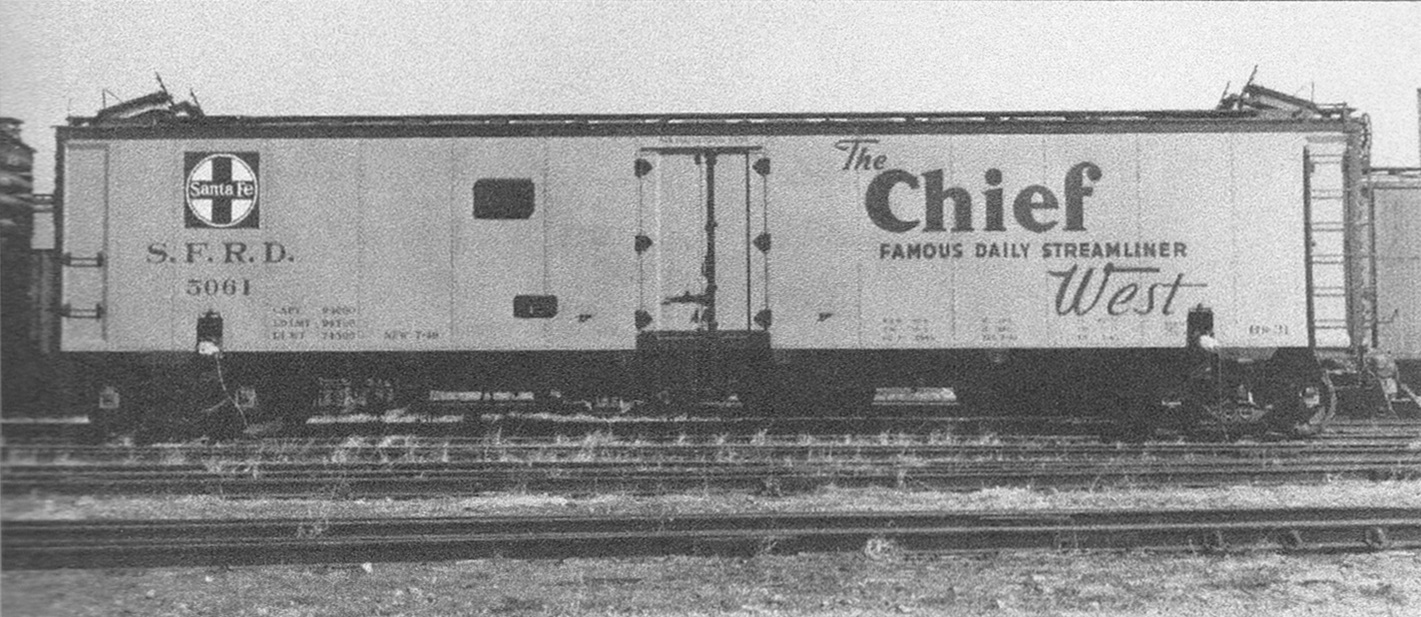Model Information: Model: Introduction: 2006. ERA: 1940s to 1960s. This model features: Razor-sharp printing and painting, Santa Fe style "reversed" ice hatches, Separate brake rigging, McHenry N scale couplers installed, Super detailed car body - first time ever produced. These colorful cars are intended to capture the flavor of vintage 50 foot Ice Reefers.
This is a fairly accurate model of a Santa Fe RR-30 reefer. The prototypes were made in 1939 (or 1940 depending on source) and 100 of them were made in total. George Irwin shared with me "My understanding is that it is an accurate model of the Santa Fe's RR-30 class. It is prototypical for all of the Santa Fe paint schemes Athearn has done on it-- and absolutely none of the other paint schemes Athearn has used." Furthermore the fan detail is only accurate for the first 75 models in the prototype series as the final 25 had Preco fans.
This is a fairly accurate model of a Santa Fe RR-30 reefer. The prototypes were made in 1939 (or 1940 depending on source) and 100 of them were made in total. George Irwin shared with me "My understanding is that it is an accurate model of the Santa Fe's RR-30 class. It is prototypical for all of the Santa Fe paint schemes Athearn has done on it-- and absolutely none of the other paint schemes Athearn has used." Furthermore the fan detail is only accurate for the first 75 models in the prototype series as the final 25 had Preco fans.
Prototype History: Santa Fe ordered 100 (37290-37389) of these cars in 1939. The last 25 of these had Preco fans installed. These cars were not specifically intended for frozen food service. If not particularly frozen food service, then what? Well, there's frozen juice, flowers, wine, fish and other commodities which were high volume, low weight, making the 50 foot cars more suitable.
All were delivered with a Super Chief slogan and early straight line map opposite. Of course, when they were repainted at various times, typically ten years out, they would have gotten any of the Ship and Travel slogans (post 1947), and after 1959, the Big Circle Herald.
All were delivered with a Super Chief slogan and early straight line map opposite. Of course, when they were repainted at various times, typically ten years out, they would have gotten any of the Ship and Travel slogans (post 1947), and after 1959, the Big Circle Herald.
Road Name History: The Railway Express Agency (REA) was a national monopoly set up by the United States federal government in 1917. Rail express services provided small package and parcel transportation using the extant railroad infrastructure much as UPS functions today using the road system. The United States government was concerned about the rapid, safe movement of parcels, money, and goods during World War I and REA was its solution to this problem. REA ceased operations in 1975, when its business model ceased to be viable.
The first parcel express agency in the United States is generally considered to have been started by William Frederick Harnden (1812-1845), who in 1839 began regular trips between New York City and Boston, Massachusetts as a courier transporting small parcels, currency and other valuables. William G. Fargo, a New York Central freight clerk at Auburn, N.Y., and Henry Wells, a leather worker at Batavia, N.Y., organized Wells Fargo & Co. in 1853. Other parcel express pioneers include Henry B. Plant, who formed Southern Express Company, Alvin Adams who founded Adams Express Company, and John Warren Butterfield. Express delivery in the early 19th century was virtually all done via horse, either via stagecoach or by riders. Ad for a railroad, showing American Railway Express service along the line. 1922
The express business flourished in the latter half of the 19th century, and by 1900 there were four principal parcel express companies, all of which included the rapidly advancing railways as one of their means of transport: Adams Express Company, Southern Express Company, American Express Company, and Wells Fargo. In 1913 the U.S. Post Office introduced its Parcel Post service, which offered major competition for the express companies. Despite this, private railway express business increased steadily through the end of World War I.
During World War I, the United States Railroad Administration (USRA) took over the nation's railroads. Under the USRA, the four major and three minor express companies were consolidated as American Railway Express, Inc., save the portion of Southern Express that operated over the Southern Railway and the Mobile & Ohio. Railway Express Agency office, San Augustine, Texas, 1939 REA electric truck circa 1920.
In March 1929, the assets and operations of American Railway Express Inc. were transferred to Railway Express Agency (REA). REA was owned by 86 railroads in proportion to the express traffic on their lines - no one railroad or group of railroads had control of the agency. In response to customer demand, REA added a Chicago, Illinois-based refrigerator car line. In 1927, REA began an Air Express Division. In 1938, the remainder of Southern Express also joined the consolidated REA.
The first parcel express agency in the United States is generally considered to have been started by William Frederick Harnden (1812-1845), who in 1839 began regular trips between New York City and Boston, Massachusetts as a courier transporting small parcels, currency and other valuables. William G. Fargo, a New York Central freight clerk at Auburn, N.Y., and Henry Wells, a leather worker at Batavia, N.Y., organized Wells Fargo & Co. in 1853. Other parcel express pioneers include Henry B. Plant, who formed Southern Express Company, Alvin Adams who founded Adams Express Company, and John Warren Butterfield. Express delivery in the early 19th century was virtually all done via horse, either via stagecoach or by riders. Ad for a railroad, showing American Railway Express service along the line. 1922
The express business flourished in the latter half of the 19th century, and by 1900 there were four principal parcel express companies, all of which included the rapidly advancing railways as one of their means of transport: Adams Express Company, Southern Express Company, American Express Company, and Wells Fargo. In 1913 the U.S. Post Office introduced its Parcel Post service, which offered major competition for the express companies. Despite this, private railway express business increased steadily through the end of World War I.
During World War I, the United States Railroad Administration (USRA) took over the nation's railroads. Under the USRA, the four major and three minor express companies were consolidated as American Railway Express, Inc., save the portion of Southern Express that operated over the Southern Railway and the Mobile & Ohio. Railway Express Agency office, San Augustine, Texas, 1939 REA electric truck circa 1920.
In March 1929, the assets and operations of American Railway Express Inc. were transferred to Railway Express Agency (REA). REA was owned by 86 railroads in proportion to the express traffic on their lines - no one railroad or group of railroads had control of the agency. In response to customer demand, REA added a Chicago, Illinois-based refrigerator car line. In 1927, REA began an Air Express Division. In 1938, the remainder of Southern Express also joined the consolidated REA.
Brand/Importer Information: Athearn's history began in 1938, when its founder-to-be, Irvin Athearn, started an elaborate O scale layout in his mother's house. After placing an ad selling the layout, and receiving much response to it, Irv decided that selling model railroads would be a good living. He sold train products out of his mother's house through most of the 1940s. After becoming a full-time retailer in 1946, Irv opened a separate facility in Hawthorne, California in 1948, and that same year he branched into HO scale models for the first time.
Athearn acquired the Globe Models product line and improved upon it, introducing a comprehensive array of locomotive, passenger and freight car models. Improvements included all-wheel drive and electrical contact. One innovation was the "Hi-Fi" drive mechanism, employing small rubber bands to transfer motion from the motor spindle to the axles. Another was the double-ended ring magnet motor, which permitted easy connection to all-wheel-drive assemblies. Athearn was also able to incorporate flywheels into double-ended drives.
The company produced a model of the Boston & Maine P4 class Pacific steam locomotive which incorporated a cast zinc alloy base and thermoplastic resin superstructure. It had a worm drive and all power pickup was through the bipolar trucks that carried the tender. This item was discontinued after the Wilson motor was no longer available, and was not redesigned for a more technologically advanced motor.
Athearn's car fleet included shorter-than-scale interpretations of passenger cars of Southern Pacific and Atchison, Topeka & Santa Fe Railroad prototypes. The company also offered a variety of scale-length freight cars with sprung and equalized trucks. The cars could be obtained in simple kit form, or ready-to-run in windowed display boxes. The comprehensive scope of the product line contributed to the popularity of HO as a model railroad scale, due to the ready availability of items and their low cost.
Irv Athearn died in 1991. New owners took control in 1994, but continued to follow Athearn's commitment to high-quality products at reasonable prices. Athearn was bought in 2004 by Horizon Hobby. Athearn was then moved from its facility in Compton to a new facility in Carson, California. In mid-2009, all remaining US production was moved to China and warehousing moved to parent Horizon Hobby. Sales and product development was relocated to a smaller facility in Long Beach, California.
Read more on Wikipedia and Athearn website.
Athearn acquired the Globe Models product line and improved upon it, introducing a comprehensive array of locomotive, passenger and freight car models. Improvements included all-wheel drive and electrical contact. One innovation was the "Hi-Fi" drive mechanism, employing small rubber bands to transfer motion from the motor spindle to the axles. Another was the double-ended ring magnet motor, which permitted easy connection to all-wheel-drive assemblies. Athearn was also able to incorporate flywheels into double-ended drives.
The company produced a model of the Boston & Maine P4 class Pacific steam locomotive which incorporated a cast zinc alloy base and thermoplastic resin superstructure. It had a worm drive and all power pickup was through the bipolar trucks that carried the tender. This item was discontinued after the Wilson motor was no longer available, and was not redesigned for a more technologically advanced motor.
Athearn's car fleet included shorter-than-scale interpretations of passenger cars of Southern Pacific and Atchison, Topeka & Santa Fe Railroad prototypes. The company also offered a variety of scale-length freight cars with sprung and equalized trucks. The cars could be obtained in simple kit form, or ready-to-run in windowed display boxes. The comprehensive scope of the product line contributed to the popularity of HO as a model railroad scale, due to the ready availability of items and their low cost.
Irv Athearn died in 1991. New owners took control in 1994, but continued to follow Athearn's commitment to high-quality products at reasonable prices. Athearn was bought in 2004 by Horizon Hobby. Athearn was then moved from its facility in Compton to a new facility in Carson, California. In mid-2009, all remaining US production was moved to China and warehousing moved to parent Horizon Hobby. Sales and product development was relocated to a smaller facility in Long Beach, California.
Read more on Wikipedia and Athearn website.
Item created by: gdm on 2019-07-01 15:27:50
If you see errors or missing data in this entry, please feel free to log in and edit it. Anyone with a Gmail account can log in instantly.
If you see errors or missing data in this entry, please feel free to log in and edit it. Anyone with a Gmail account can log in instantly.


